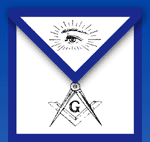| |
|
 |
The first question that is usually asked by a non-Mason is, "What is freemasonry?" There are many definitions of the word, but none are complete because the organization embraces a wide scope of activity. But in short definition is: Freemasonry is a fraternal organization, religious in character, based on the principle of the Fatherhood of God and the Brotherhood of Man which does charitable work in the community and among its members and through its teachings and ceremonies seeks to make good men better and thereby make the world a better place in which to live. Freemasonry is a "voluntary" association in that no one is invited to become a member. Unlike college fraternities and other organizations. Freemasonry never solicits anyone to become a member. As a matter of fact, it is a violation of Masonic law for a member to invite anyone to join the Craft. A prospective member must truly come of his own free will and accord.
Freemasonry is not a religion. Sometimes outsiders claim that the Craft is a religion. Most Freemasons do belong to an established Church. Freemasons do not go to the Lodge to worship God, they do this on Sunday when each Freemason goes to his own church. It is religious, in that one cannot become a Freemason unless he believes in God; but there is no religious test applied to the prospective member, nor is he required or asked to subscribe to any religious tenet or dogma. It is forbidden to discuss religion or politics in the Lodge. Freemasonry is not a "secret society. " A secret society is one that keeps its existence in secret, and whose members do not make known their affiliation with the group. Freemasonry is not a secret society because it does not hide its existence, members do not hide their membership; but on the contrary, the organization meets in buildings located on public: streets, announces its meetings in the newspapers and magazines, engraves the words "Masonic Temple" on many of its buildings, publishes periodicals, and has homes for orphans .and the aged Like most organizations, it has some "secrets," but it is not a "secret society."
The degrees of Freemasonry consist of ceremonies of a strictly serious nature, without horseplay, which teaches basic moral truths in an impressive and solemn manner. When the degrees are completed, the new member is provided a ritual that contains a philosophy of rite that provides the new member with something on winch to build a hope that is eternal. Sometimes a non-Mason wants to know about the ceremony of initiation In general terms, each candidate takes part in a ceremony of initiation, is then advanced to the promotion from one degree to the other. The advancement depends on his proficiency in learning certain things relating to Freemasonry, its ethics, and its philosophy. Nobody ever took the degrees without becoming a better person. The basic ethical principles exemplified in the ceremonies of the degrees are such as are accepted by all good men, they are lessons based on the golden rule, tolerance towards all people, respect for one's family, charity towards all and being true to God for His manifold blessings. Freemasons are proud to proclaim to the world that we are a serious organization of mature men and woman, an organization that instills a love of God, teaches charity in its broadest sense, and shows each member how to live a better life truths. Freemasons take the simple tools of an operative Mason and use them as symbols to teach basic moral truths.
Non-Masons sometimes wonder at the close bond that exists between Freemasons. There is a simple explanation: Masons are bound together by the deep and abiding knowledge that each of them, during the ceremonies of the degrees, has accepted certain high ethical standards of conduct. These standards insure a bond of faith and confidence. Thousands
of books have been published on the subject of Freemasonry. The matters discussed
on this website are just a few of the things about the organizations, but they
are enough to show that Freemasonry is one of the great organizations of the world
and a steadying influence in a faltering civilization. Freemasonry's Recent History In 1717, four London Lodges came together to form a Grand Lodge, the beginnings of organised Freemasonry. In 1725, the Irish and subsequently in 1736, the Scottish also formed their own Grand Lodges. Between them, the British Grand Lodges spread Freemasonry over much of the globe. In time, independent Grand Lodges flourished in many parts of the world. Each developed its own traditions and differences, but all subscribe to the three basic principles of Brotherly Love, Relief and Truth. Freemasonry is a society of men concerned with moral and spiritual values. The essential aim is to promote the building of a better man in a better world. Freemasons are taught its precepts through a series of ritual dramas which follow ancient forms and use stonemasons’ customs and tools as allegorical guides. Criteria for Membership The essential qualification for membership is a belief in a Supreme Being. Membership is open to men of any race or religion who can fulfill this essential qualification and are of good repute. Freemasonry and Religion Freemasonry is not a religion, nor is it a substitute for religion. It demands of its members a belief in a Supreme Being but provides no system of faith of its own. All religious polemic and speculation was - and is - forbidden within the Lodge. Sectarian division has thus been avoided and the Craft is open to all men of good repute, regardless of their personal religious beliefs. Freemasonry and Society Freemasonry
demands from its members a respect for the law of the country in which a man works
and lives. Its principles do not in any way conflict with its members’ duties
as citizens, but should strengthen them in fulfilling their public and private
responsibilities. The use by a Freemason of his membership to promote his own
or anyone else’s business, professional or personal interests is condemned,
and is contrary to the conditions on which he seeks admission to Freemasonry. Bro
Contact
the Webmaster:
|





